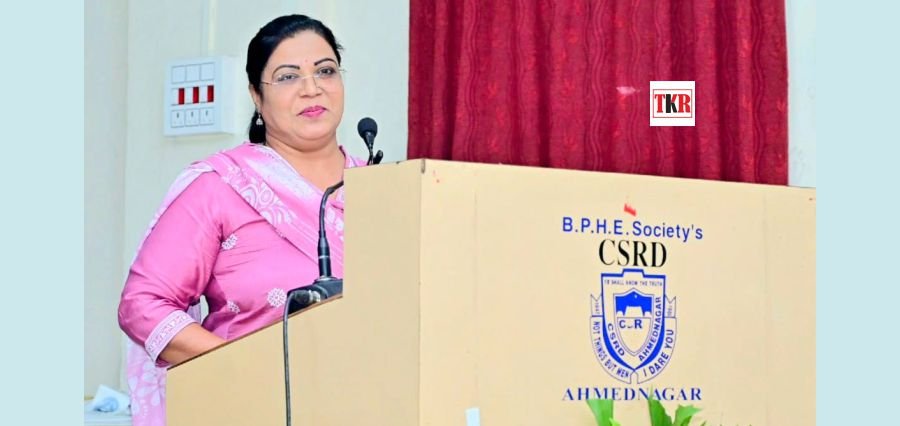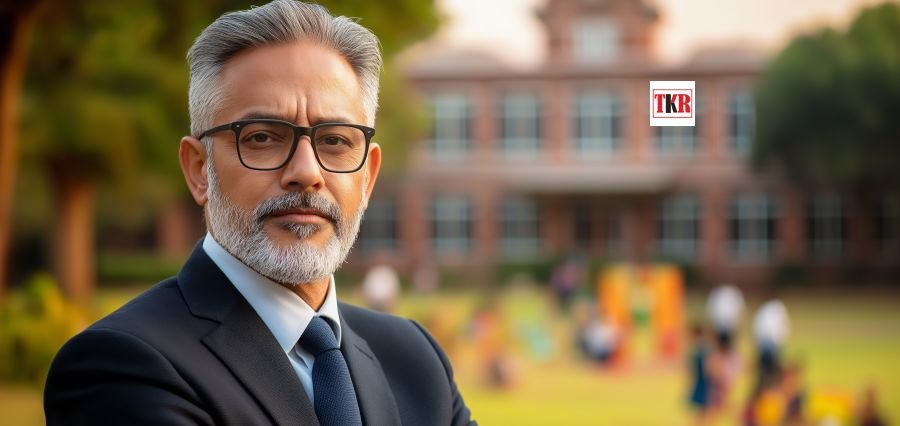Education leadership is not defined by a title; it is a long, evolving journey shaped by purpose, continuous learning, resilience, and service.
For Prof Dr. Swathi Munoth, Principal, KG College of Arts and Commerce, this journey began not in a boardroom or a classroom, but in a modest, middle-class Maharashtrian household where values like learning, sincerity, and social contribution were deeply ingrained. As she reflects on the past three decades of her academic, professional, and social engagement, it becomes evident that each phase of her life has served as a stepping stone toward becoming a dedicated educator and a transformative leader who deeply believes in the power of knowledge to inspire change.
From an early age, Swathi was taught that education was not merely a route to personal success, but a powerful tool for community upliftment. This foundational belief planted the seeds of her enduring passion for mass communication and human resource management, two disciplines that bring together people, policies, and performance in meaningful ways.
Journey from Literature to Mass Relations
Swathi completed her B.A. in English Literature with first-class honours from Pune University in 1992. This phase played a crucial role in shaping her critical thinking and communication skills. Her academic curiosity continued to grow, leading her to pursue an M.A. in Mass Relations from the same university, which she completed in 1994. This program provided more than just theoretical grounding; it sparked a deep interest in development communication and social outreach, elements that would go on to define her professional identity.
Where Purpose Found a Platform
The real turning point in Swathi’s journey came in 1993 when she began her teaching career at the Centre for Studies in Rural Development (CSRD) under the BPHE Society in Ahmednagar. For over a decade, she served as a faculty member for the M.A. (Mass Relations) program. These years offered rich exposure to interdisciplinary learning, curriculum development, and student engagement. Swathi was not just a lecturer; she took on multiple roles, including mentor, curriculum developer, and often counsellor to students from diverse and challenging backgrounds.
A Vision Realised in Rural Maharashtra
Swathi developed syllabi on soft skills, development communication, and organisational behaviour for Savitribai Phule Pune University, carefully aligning academic content with evolving industry expectations and the diverse needs of rural and urban students. Through this work, she came to understand that education must evolve alongside society and technology. She took it upon herself to ensure that learning remained relevant, applied, and forward-looking.
In 2007, Swathi was appointed Principal of K.G. College of Arts and Commerce in Ahmednagar. This marked a significant milestone in her transition from academician to institutional leader. For her, leading an educational institution has never been just about administration; it is about setting a vision, inspiring stakeholders, and navigating systemic challenges. From the outset, she was determined to shape the college into more than just a degree-granting institution. She envisioned it as a centre of excellence where economically disadvantaged and first-generation learners could access inclusive, high-quality, and skill-based education.
Over the past 17 years, this vision has guided every initiative she has led, from NAAC accreditation and curriculum innovation to green campus initiatives and faculty development programs.
The Power of Belief
Swathi has faced numerous challenges throughout her professional journey, one of the most significant being the sudden closure of the CSRD department, a decision made by the management due to personal reasons. It was a difficult and uncertain time. Many, including her mentor, advised her to move to Pune or Mumbai in pursuit of better opportunities.
But Swathi held a different vision. Deeply connected to Ahmednagar, her birthplace, she felt a strong sense of responsibility to give back to the community that had shaped her. She believed that meaningful change could be created right where she was.
After several discussions and reflections, Swathi and her colleagues approached Shri Hastimalji Munoth and Shri Kishore Munoth, visionary pioneers in Ahmednagar’s cooperative banking sector. They requested space to launch a journalism course. In an inspiring show of support, the Munoths generously offered them premises.
Yet, as plans unfolded, Swathi and her team saw a broader opportunity. Rather than limiting themselves to a journalism program, they decided to establish an entire college, one that could serve the wider educational needs of the region.
Backed by a forward-thinking and supportive management, the college took its first steps. During an inspection by the university committee, the members suggested that Swathi take on the role of principal. With a deep sense of commitment, she accepted the responsibility, marking a significant new chapter in her life.
However, the path was not without further obstacles. When her approval as principal was up for consideration, a university official raised objections, not due to any shortcomings in her documentation, but based on personal expectations. Swathi stood her ground with integrity and stated firmly, “My documents are clear. I will not compromise on my integrity.” Despite her qualifications, her approval was rejected.
Undeterred, Swathi remained resilient. Her management stood by her and appointed her as Campus Director. Since then, she has devoted herself fully to the growth, development, and vision of the institution, continuing her mission to uplift education in Ahmednagar with unwavering dedication.
Where Administration Meets Compassion
As Principal, Swathi took on a wide range of responsibilities, including managing affiliations, budgets, human resources, audits, inspections, and student welfare, all while maintaining academic standards. Her leadership style evolved to become both collaborative and empathetic, shaped by a deep understanding of the socio-economic pressures faced by her student population.
Soft Skills for a Stronger Tomorrow
Swathi’s leadership extended beyond the walls of her college. She became a certified trainer in soft skills, communication, and leadership development. She has conducted workshops on stress management, change management, and motivation for educators, entrepreneurs, and young professionals. Many of these sessions, held under the aegis of prestigious institutions such as the Reserve Bank of India and the Watershed Organisation Trust (WOTR), enabled her to translate academic insights into practical tools for personal and organisational transformation.
Cultivating Curiosity
Over the years, Swathi also took on roles as a Ph.D. referee, paper setter, and examiner for postgraduate programs across Pune, Amravati, and Nagpur Universities. These responsibilities have kept her actively engaged with academia at multiple levels, from ensuring research quality to mentoring doctoral candidates. She takes pride in guiding several researchers and young educators who have since made meaningful contributions to their fields.
Shaping Eco-Literate Institutions
In recent years, Swathi’s journey has taken a new dimension with a focus on environmental management. After becoming a certified lead auditor in green compliance (ISO 14001:2015), she began researching and advocating for sustainable practices within educational institutions. Her papers on green audits, green marketing, and environmental governance reflect her conviction that future education leaders must combine academic excellence with environmental consciousness. She firmly believes that education should go beyond awarding degrees and instead develop responsible citizens who care for both society and the planet. Through green audit training, faculty sensitisation programs, and participation in international conferences, Swathi has worked to embed sustainability into the institutional culture of colleges in Ahmednagar and beyond.
Contributions to Global Skills Education
Swathi mentions, “Throughout my career, I have continued to write and present research that bridges theory and practice. From analysing HR practices in small-scale industries to understanding online learning preparedness, my research has consistently addressed contemporary issues.” Publishing in national and international journals has expanded her reach while sharpening her academic rigour and credibility as a scholar-leader. Notably, her book Soft Skills and Communication in a Globalised World (2024) represents the culmination of her long-standing commitment to skill development. This work serves not only as a publication but also as a pedagogical tool designed to help educators and students navigate the rapidly changing dynamics of the global workplace.
Honours that Reflect Heart and Hustle
Over the years, Swathi has been humbled to receive several awards, including:
- International Eminence Excellence Award (Dubai, 2023)
- Indian Glory Award for Educational Excellence (2024)
- Narishakti Sanman (2024, Maharashtra)
- National Leadership Award (2020)
While awards are not the goal, they serve as meaningful recognition of the work done with sincerity and vision. They also motivate her to keep pushing boundaries and remain a role model, especially for women in academia.
Swathi’s Multi-Platform Impact
Parallel to her academic career, Swathi has remained active as a freelance journalist and social commentator, writing on education, women’s rights, the environment, and youth development. She has participated in national seminars on child rights and collaborated with research committees to help shape state-level policies. “This multi-platform engagement has reinforced my belief that a leader must remain rooted in ground realities while shaping long-term strategies,” Swathi shares.
The Power of Purpose and Service
For Swathi, leadership has always been about service. She never sought leadership for the recognition; rather, it emerged organically from her deep commitment to students, colleagues, and society. Every classroom she entered, every curriculum she designed, and every young mind she mentored shaped her as much as she shaped them.
Her journey to becoming a leader in education has been marked by continuous learning, challenges, and moments of profound fulfilment. Today, as she continues to guide young minds, faculty, and institutions, she does so with the humility of a learner and the courage of a leader; one who is still evolving, still dreaming, and still serving.
Transforming K G College into a Model of Flexible Learning
K G College of Arts and Commerce stays progressive by regularly updating its curriculum with skill-based and industry-relevant courses in alignment with NEP guidelines. Flexible class timings and comprehensive support systems accommodate working and dropout students. The college emphasizes faculty development through ongoing training and digital integration, promoting inclusive practices, mentorship, and community engagement for holistic student growth.
Under Dr. Swathi’s leadership, the college follows a decentralised approach that empowers faculty with meaningful responsibilities, encouraging innovation and involving them in decision-making. This, supported by workshops and open communication, has created a motivated and collaborative environment.
One of her significant achievements is transforming public perception of evening colleges. She led K G College to thrive by implementing ISO standards, achieving green compliance, and securing NAAC accreditation with a ‘C’ grade, making it the second evening college under Savitribai Phule Pune University to do so.
Swathi shares, “I delegate administrative tasks through a decentralised system, which allows me to stay connected with students through mentoring, open-door policies, and regular interactions.”
Swathi believes that while their college may not be among the largest or most prestigious, it stands tall in its mission to uplift and empower. The majority of their students come from economically marginalized backgrounds, yet each one carries the potential to succeed. Swathi and her team are deeply committed to nurturing that potential, building careers, and instilling the confidence needed to move forward in life. She acknowledges the unwavering support of the management, whose cooperation strengthens this shared mission. In her view, they are giving back to society in a meaningful way, because someone must take the lead and be the change.





